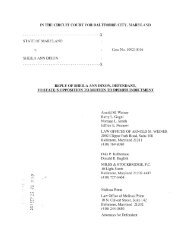Memorandum Opinion - the Circuit Court for Baltimore City
Memorandum Opinion - the Circuit Court for Baltimore City
Memorandum Opinion - the Circuit Court for Baltimore City
You also want an ePaper? Increase the reach of your titles
YUMPU automatically turns print PDFs into web optimized ePapers that Google loves.
v. Prince George’s County, 266 Md. 316, 318 (1972))(emphasis added). See also Blundonv. Taylor, 364 MD. 1, 22 (2001)(An outright failure to comply is not substantial compliance).“Substantial compliance is such communication that provides <strong>the</strong> State requisite and timelynotice of facts and circumstances giving rise to <strong>the</strong> claim.” Id. at 172 (citing Condon v. Stateof Maryland- University of Maryland, 332 Md. 481, 496 (1993)(quoting Conaway v. State,90 Md.App. 234, 246)(internal quotations omitted))(emphasis added). In Norouzi, <strong>the</strong> <strong>Court</strong>found a claimant’s notice to <strong>the</strong> county’s third-party administrator substantially compliedwith <strong>the</strong> Act. Vertis’ notice 18 days after <strong>the</strong> 180 day time period had passed was not timely,and <strong>the</strong>re<strong>for</strong>e not substantial compliance. See Nationwide Mutual Fire Insurance Co., vWashington Suburban Sanitary Commission, 170 F. Supp. 2d 570, 572 (D. Md.2001)(plaintiff did not substantially comply by giving notice 14 days after <strong>the</strong> time hadpassed)Good Cause <strong>for</strong> Non-Compliance. Even if a party has not complied with <strong>the</strong> noticerequirement, <strong>the</strong> action must not be dismissed if <strong>the</strong> party can show good cause <strong>for</strong> failingto comply.(c) Notwithstanding <strong>the</strong> o<strong>the</strong>r provisions of this section, unless<strong>the</strong> defendant can affirmatively show that its defense has beenprejudiced by lack of required notice, upon motion and <strong>for</strong> goodcause shown <strong>the</strong> court may entertain <strong>the</strong> suit even though <strong>the</strong>required notice was not given.§ 5-304(c). ARAMARK and Vertis state in <strong>the</strong>ir complaint, “[i]n <strong>the</strong> event that <strong>Baltimore</strong>raises any issue of notice, Plaintiffs hereby move <strong>for</strong> waiver of notice requirements <strong>for</strong> goodcause under Section 5-304(c) as <strong>Baltimore</strong> cannot affirmatively show that its defense hasbeen prejudiced.” However, be<strong>for</strong>e <strong>the</strong> court considers if <strong>the</strong> defendant was prejudiced byfailure to give notice, <strong>the</strong> plaintiffs must demonstrate “to <strong>the</strong> trial court good cause <strong>for</strong> <strong>the</strong>ir4
failure to abide by <strong>the</strong> notice requirement.” Hargrove v. Mayor and <strong>City</strong> Council of<strong>Baltimore</strong>, 146 Md. App. 457, 462 (2002).“The question of whe<strong>the</strong>r good cause <strong>for</strong> waiver exists is clearly within <strong>the</strong> discretionof <strong>the</strong> trial judge.” Heron v. Strader, 361 Md. 258, 270 (2000). “The test <strong>for</strong> whe<strong>the</strong>r goodcause exists . . . is ‘whe<strong>the</strong>r <strong>the</strong> claimant prosecuted his claim with that degree of diligencethat an ordinarily prudent person would have exercised under <strong>the</strong> same or similarcircumstances.’” Id. at 271 (quoting Westfarm Assoc. v. Washington Suburban SanitaryComm’n, 66 F.3d 669, 676-66 (4 th Cir. 1995))(internal citations omitted). In Heron <strong>the</strong> Cour<strong>the</strong>ld that it was not an abuse of discretion <strong>for</strong> <strong>the</strong> trial court to find that <strong>the</strong> pendency of acriminal case was not good cause <strong>for</strong> <strong>the</strong> late filing of <strong>the</strong> civil case pursuant to <strong>the</strong> Act. 361Md. at 271. In sum, <strong>the</strong> court’s discretion is broad and will not be disturbed absent ashowing of abuse. Id. (citing Westfarm Assoc., 66 F.3d at 676).ARAMARK and Vertis argue that it was prudent <strong>for</strong> <strong>the</strong>m to wait until <strong>the</strong> completionof <strong>the</strong> state and federal investigations to file suit. This argument fails. First, as noted earlierVertis attempted to provide notice almost two and a half years ago. Second, o<strong>the</strong>r claimantsgave <strong>the</strong> <strong>City</strong> notice within <strong>the</strong> required time periods. Third, <strong>the</strong>re is nothing to indicate <strong>the</strong>state and federal investigations were concluded be<strong>for</strong>e <strong>the</strong>se plaintiffs filed <strong>the</strong> complaintwithin <strong>the</strong> time required by <strong>the</strong> statue of limitations.This <strong>Court</strong> finds that not to be a goodcause <strong>for</strong> <strong>the</strong> untimely filing of notice pursuant to <strong>the</strong> Act. This <strong>Court</strong> concludes thatARAMARK and Vertis have not shown good cause <strong>for</strong> <strong>the</strong>ir failure to comply with <strong>the</strong>notice requirement.Harper argues that because she is not a Maryland resident and “is unschooled inlitigation matters,” she did not “realize” that she could bring suit until after <strong>the</strong> 180-day time5
Design Tech Builders, Inc., 358 Md. 435, 445 (2000), providesA claimant reasonably should know of a wrong if <strong>the</strong> claimanthas "knowledge of circumstances which ought to have put aperson of ordinary prudence on inquiry [thus, charging <strong>the</strong>individual] with notice of all facts which such an investigationwould in all probability have disclosed if it had been properlypursued.”Id. at 445 (citations omitted). Because <strong>the</strong> Complaint against <strong>the</strong> <strong>City</strong> is barred by failureto give notice as required by <strong>the</strong> Act, <strong>the</strong>re is no reason to give Harper an opportunity toamend her complaint to allege facts that may show that <strong>the</strong> discovery rule should apply.ConclusionFor <strong>the</strong> <strong>for</strong>egoing reasons, <strong>the</strong> <strong>Court</strong> will grant <strong>the</strong> <strong>City</strong>’s Motions to Dismiss and denyARAMARK and Vertis’ Motion <strong>for</strong> Waiver of Notice Under <strong>the</strong> Local Government TortClaims Act.__________________________________________Date November 12, 2004 JUDGE EVELYN OMEGA CANNONcc:David Skeen, Attorney <strong>for</strong> PlaintiffThomas F. Yost, Jr., Attorney <strong>for</strong> PlaintiffRichard Magid, Attorney <strong>for</strong> Defendant<strong>City</strong>MotiontoDismiss.Aramark and Harper.Final.wpd7
















